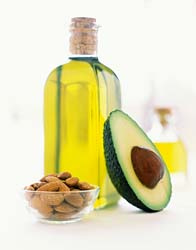Fat may not be the diet villain we were led to believe, at least when it comes to “healthy fats”. For years we have heard that fats make you fat! We had the “fat free” craze of the 90’s with all the low fat and fat free versions of our favorite foods showing up on the grocery shelves. You may have noticed though if you look at the labels of the “fat free” foods, they typically have higher amounts of sugar to compensate for the taste.
You’ll be happy to know that our bodies DO need a small amount of fat to stay healthy, maintain an active metabolism, and keep our heart and bodies functioning properly. It comes down to choosing your fats wisely! Healthy fats can help keep our appetite satisfied so we are not craving and eating all the sweet and sugary foods. When mixed with a well-balanced nutritious meal, they can help slow down the digestion process reducing the amount of insulin released, keeping us from those unhealthy cravings while helping reduce our risks of Type II Diabetes!
Not all fats are created equal, so choosing wisely is the key!
The type of fats as well as the quantity is important. Tran’s fats and hydrogenated oils should be avoided, while saturated fats need to be limited as they can contribute to higher “LDL” and total cholesterol. We need to make the right choices when including fats in our diet. When choosing healthy fats, including the omega 3 fats found in salmon and walnuts, they not only nourish our bodies but have been linked to lowering risks of inflammation and heart disease.
Here are some examples of healthy fats.
- Extra Virgin olive oil
- Grapeseed Oil
- Avocados
- Raw cashews, almonds, walnuts, and sunflower seeds*Coconut & Coconut oil (note the difference in this saturated fat)
Replacing the butter, mayonnaise, and other saturated fats with healthier ones is not as difficult as you may think. Try replacing mayonnaise on your next sandwich with avocado, and olive oil for that next loaf of crusty bread. You may even enjoy the taste more!
One fat that has been controversial on its health benefits is coconut oil. While it is a saturated fat, it is a medium chain fatty acid which metabolizes differently in our body and doesn’t appear to have the negative impact that other saturated fats can have. It contains lauric acid which has been shown to increase HDL (good cholesterol) along with digestion and many other health benefits. It has a high smoking point, so it’s good to use for some forms of cooking in place of butter. Just keep in mind, daily fat intake still needs to be limited, even if they are healthier fats.
So when you’re making that lunch salad, add some avocado and walnuts to see the difference it can make in taste, cravings, and maybe even on the scale!
http://www.ncbi.nlm.nih.gov/pubmed/19437058
http://www.doctoroz.com/videos/surprising-health-benefits-coconut-oil
http://www.hsph.harvard.edu/nutritionsource/type-2-diabetes/


